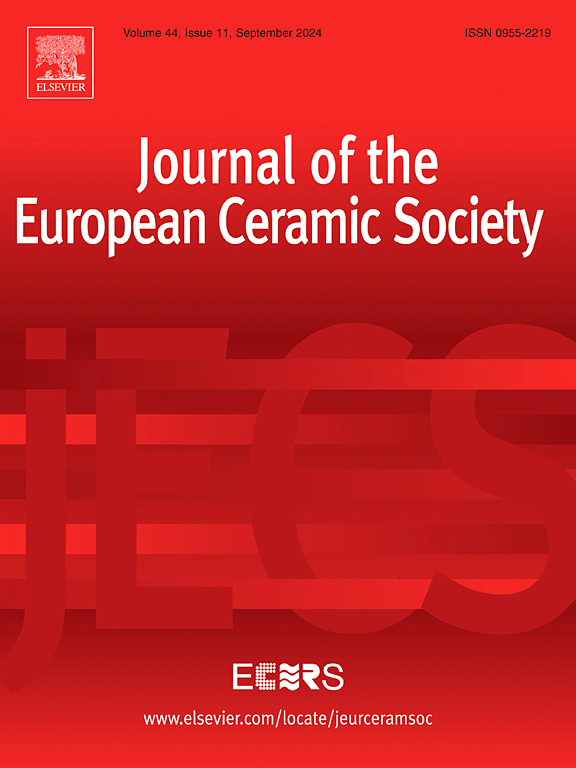Composition-dependent structural, microstructural and functional characteristics of fine-grained BaTi1-xHfxO3 ceramics consolidated by Spark Plasma Sintering
IF 6.2
2区 材料科学
Q1 MATERIALS SCIENCE, CERAMICS
Journal of The European Ceramic Society
Pub Date : 2025-06-06
DOI:10.1016/j.jeurceramsoc.2025.117600
引用次数: 0
Abstract
The functional properties of BaTi1-xHfxO3 (0 ≤x ≤ 0.20) ceramics consolidated by spark plasma sintering from Pechini nanopowders are discussed in terms of the synergic effect of overlapping dissimilar structural modifications, nanoscale grain size reduction and ferroelectric-relaxor crossover. Structural and Raman investigations revealed the coexistence of various polymorph modifications. The main effects of Hf addition are: (i) a strong inhibiting of the grain growth process, (ii) the reduction of TC and increase of the orthorhombic-tetragonal and rhombohedral-orthorhombic transition temperatures until a single, "pinched" and diffuse ferroelectric-paraelectric phase transition occurs, (iii) a strong flattening of the permittivity maximum, (iv) a slight decrease of the grain boundary resistivity, but still allowing the application of high a.c. and d.c. fields and (v) a gradual reduction of polarization, hysteresis loops area, energy storage capability and tunability values. Based on the dielectric and thermo-Raman results, a new low-temperature phase diagram of the fine-grained BaTi1-xHfxO3 ceramics is proposed.
火花等离子烧结细晶BaTi1-xHfxO3陶瓷的成分依赖性结构、微观结构和功能特性
从不同结构修饰叠加、纳米级晶粒尺寸减小和铁电弛豫交叉的协同效应等方面讨论了Pechini纳米粉体火花等离子烧结复合的BaTi1-xHfxO3(0 ≤x ≤ 0.20)陶瓷的功能特性。结构和拉曼研究揭示了各种多晶型修饰的共存。加入Hf的主要影响有:(i)对晶粒生长过程有很强的抑制作用,(ii) TC的降低和正交-四边形和菱形-正交转变温度的增加,直到发生单一的“挤压”和漫射铁电-准电相变,(iii)介电常数最大值的强烈平坦化,(iv)晶界电阻率略有降低,但仍允许使用高交流和直流电场,(v)极化逐渐减少。迟滞回路面积、储能能力和可调性值。基于介电和热拉曼结果,提出了一种新的细晶BaTi1-xHfxO3陶瓷的低温相图。
本文章由计算机程序翻译,如有差异,请以英文原文为准。
求助全文
约1分钟内获得全文
求助全文
来源期刊

Journal of The European Ceramic Society
工程技术-材料科学:硅酸盐
CiteScore
10.70
自引率
12.30%
发文量
863
审稿时长
35 days
期刊介绍:
The Journal of the European Ceramic Society publishes the results of original research and reviews relating to ceramic materials. Papers of either an experimental or theoretical character will be welcomed on a fully international basis. The emphasis is on novel generic science concerning the relationships between processing, microstructure and properties of polycrystalline ceramics consolidated at high temperature. Papers may relate to any of the conventional categories of ceramic: structural, functional, traditional or composite. The central objective is to sustain a high standard of research quality by means of appropriate reviewing procedures.
 求助内容:
求助内容: 应助结果提醒方式:
应助结果提醒方式:


